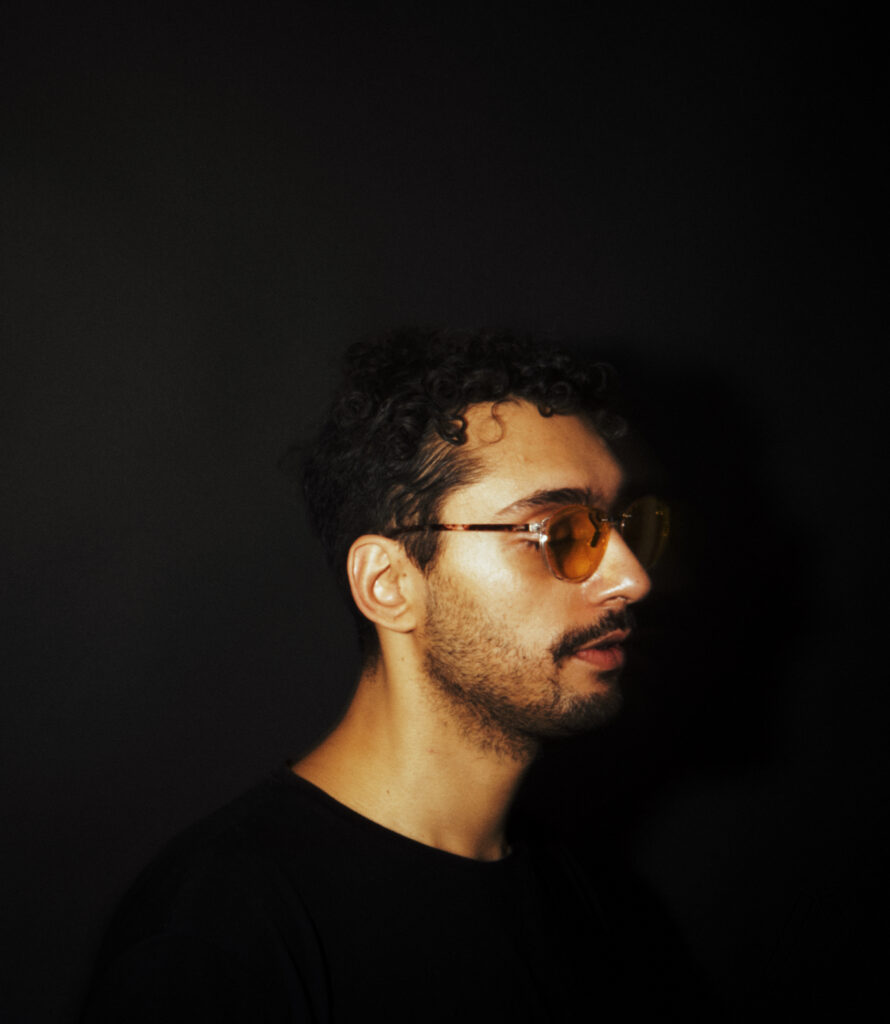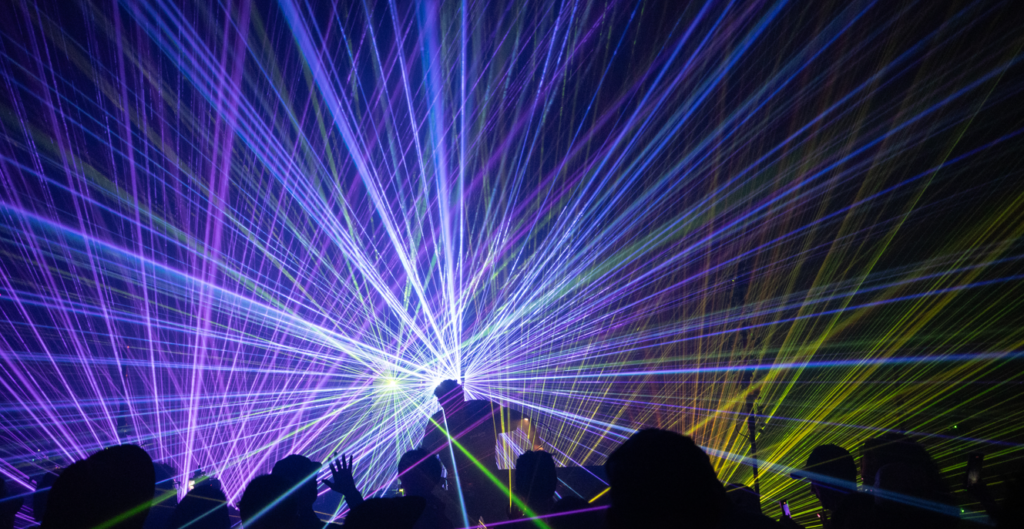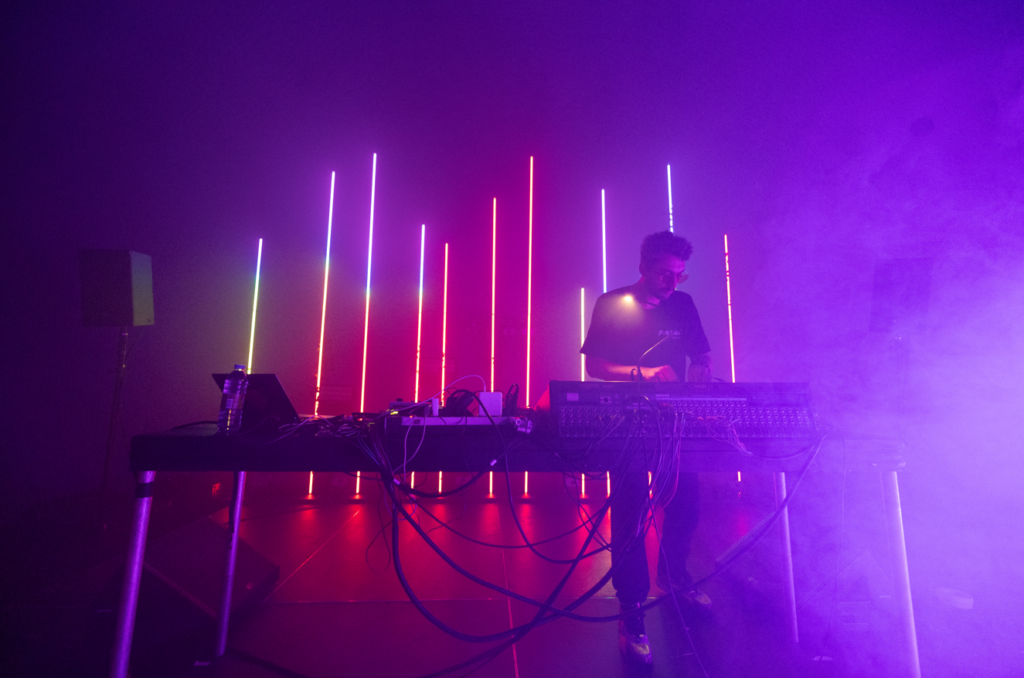"Study Your DNA": 40 Minutes with Salar Ansari

By: Layan Srour / Arab America Contributing Writer
Salar Ansari has a strong passion for creating music that connects borders and expresses authentic expression. From studying audio engineering in Dubai to shaping Detroit’s music community, his story intertwines culture, innovation, and a deep commitment to promoting collaboration. Salar’s journey highlights challenges, inspirations, and cultural influences that have shaped his path as a sound, recording, and mixing engineer.
How did you officially get into music production?
At the age of 19, I went from Tehran to Dubai, and I studied audio engineering and production at SAE. I started working as a dance music artist mainly in Dubai. I co-founded Analog Room, an organization/residency program with my brother, Mehdi Ansari, and friend, Siamak Amidi. We were curating weekly events in Al Barsha, but we’ve operated in multiple spaces. It was more about the setup rather than about a specific space.
For around ten years, we featured artists from all around the world who were at the cutting edge of the dance music spectrum, including artists from Detroit. In this ten-year run of the Analog Room, I wasn’t there for the whole thing because in 2015, I migrated to America and they kept going. However, I moved to New York and then Michigan about six months later.
How did your musical journey begin in Michigan?
I met Luis Resto, a Puerto Rican session musician, pianist, and keyboard player from Garden City, Michigan. He had been working in Detroit since the late 80s, was one of the original members of the band Was (Not Was), and was a co-writer of Marshall Mathers, also known as Eminem, since 2004.
Luis has a space at the Eastern Market on the third floor of a cheese shop named DeVries. I started managing this space. I transformed it from a musician/keyboard player’s playground and rehearsal room to a professional recording studio. At the same time, I was tapping into the local artist community musicians. Luis’ idea for his space wasn’t a business or something that was designed to bring monetary gain—he just wanted to provide for the community. Eventually, we called the space Feeder Loft and we started having resident artists. During the past decade, Luis and I have worked on many different projects together, as well as performances including my Trio, with the addition of other resident artist, and Feeder Loft session musician Pathe Jassi. We’ve had a number of very successful performances together from Dubai, to New York City to Detroit.
I was the connection to bringing a lot of young and established local artists to come and use the space. The space has a sliding scale, but artists pay the engineer. I have been involved in around 50 studio productions at the Feeder Loft or elsewhere, all kind of interconnected. In 2017, I also started working at the Arab American National Museum as their sound engineer.

How have these experiences, alongside your cultural roots, influenced the message and purpose behind your music?
One of the main reasons I moved to Detroit was to learn the traditions of making dance music. A huge portion of that came from Detroit, Michigan. I had the privilege of working and being mentored by Mike Banks, also known as Mad Mike, who is one of the founders of Underground Resistance. All these different experiences have been feeding into my life to become the artist I am today.
With the oversaturation in the world of music, it isn’t necessarily easy to get to this level of production or these circles of the music industry without choosing to, for example, live in Detroit. It’s quite beyond the surface of what is presented to people. By the time American music gets to Iran, it gets shape-shifted quite a lot through the media. A lot of what we’re talking about is black music and black culture – a lot of this gets exploited and stories get retold.
My understanding of community, the power of the music, and the importance of the message you spread has been more refined. I find myself to be more purposeful with the need and the importance of engaging with the community and saying something with the music. Even if the music makes people just feel good, that doesn’t mean that there’s anything wrong with it.
However, I am not necessarily one to enjoy promoting ideas that relate to consumerism, materialistic lifestyles, or capitalistic approaches to life. The poetic ideas of living basically get injected into my work. That’s pretty much how I can think of explaining who I am.
How did growing up in the Middle East affect your musical influences? Did that change when you moved to the United States?
I was exposed to a lot of Khaliji music. My understanding of Arab culture at its depth was something that flourished, really, living in Dearborn. Even though I lived in Dubai for six years, it is quite amazing how in Dearborn, the level of Arabic culture that exists is quite remarkable. When I lived in Dubai, I did not experience Arabic culture to this extent.
Western culture and media appealed a lot more because it was more colorful. It was more high-tech. It was shinier. As I grew to understand the concept of colonization within all aspects of life—mind, body, and the spaces you are in— and it created a mindset for me to understand and study my heritage way deeper than I ever did. As my mentor Mike Banks suggested to me, “I need to study my own DNA and find the power through the music that my ancestors have left.”
I can’t really say I have a specific deep influence that comes from specifically the Arab world because I do have influences from the Persian music heritage. There’s quite a difference between Persian music and Arab music, even though they’re deeply connected.
As a Middle Eastern artist, have you faced any challenges with society or your identity?
I often have to work twice as hard as my competition, like acquiring visas, because it makes it harder for people to work with me. They have to be more patient and understanding. Over the years, it has taken me time to learn to be more elaborate in a world where Western culture is the dominant culture.
I think my biggest struggle would first be world politics. As an international traveling artist, I’m deeply homesick. It took me seven years to see my mother and my father. This impacts your ability to deal with attachment and emotional regulation. The concept of loneliness entirely changes you—you cannot extend yourself to everybody. You also don’t have your family present, and at times, you overextend yourself and you get misunderstood. It’s not the craziest thing, people experience these things too, but these are the challenges I’ve had sometimes.
I guess, to some extent, it’s the privilege to be able to leave. At the same time, it’s a burden because you had the privilege, and now you have to do something with it. The idea of doing something crazy with life is also a burden of its own. I sometimes think life is at best lived the most simple, and the essence of life isn’t in the idea of doing big things, but it’s in the idea of enjoying doing little things. It’s quite hard when you feel the pressure of “I have to apply for my visa,” or “I’m not recieving the monetary gain I need,” or “have I done enough as an artist this year? Am I doing enough now that I’ve left?” I’m privileged enough to be here. I’m just being honest about the things that have an emotional toll.

You mentioned that you’re a sound engineer, but in your personal career, how do you use your culture in your music?
Well, I just implement it on a constructional level to my music, but I have found the best way to contribute to the echoing of our culture, the voices of our people, in a more subliminal way. For issues with my survival and the threats I have received, it’s taken a long time to understand and accept that what I’m doing is enough and that I’m not betraying myself for not being able to do more than what I’m doing right now. Being able to serve at the museum, being able to stand up for the voices that matter, and being able to be proud of my identity and culture, have been the most I have been able to do.
Last year, I performed at the Mutek Festival in Montreal. I was closing the 25th anniversary of the festival and there were parts of my music that had nothing to do with Middle Eastern music. They were high-tech Persian music and a lot of people didn’t know how to receive it because where we come from, it’s not cool to do that, but to me that seemed like the best I could do to represent, and luckily a lot of people did understand it. I’ve just been proud of who I am.
What about Dearborn made you feel more connected to Arab culture rather than Dubai?
I think if I lived in Dearborn, but not working at the museum, it would have been a different experience. Working at the museum connects me with a part of the Arab community in Dearborn that the entire city of Dearborn doesn’t necessarily relate to either. It’s progressive. They’re artists and they’re thinkers! You get to be part of dialogues that strive to be proud of their identity to push their culture to remember who they are, where they come from, why their ancestors did what they did, and how important that is in their survival and wellbeing.
I cannot overemphasize how much of a safe space the museum is. Like I said, I’ve been working there for seven years and I’ve seen so many different events, exhibitions, concerts, and different arrays of people coming from all over America or outside America. The non-elitism that exists in it, the enabling of everyday voices, I think that has entirely contributed differently.
What advice would you give to Arab Americans aspiring to enter the music world?
I think just the music realm, whether it’s as an Arab or as a Persian, don’t underestimate your culture, your ancestors, your artistic DNA. Understand that we have been deprived of resources, technology, and education. It’s the combination of these that pushes the boundaries of our artistic realm. For musical movements, there is an aesthetic to them, and then there’s an essence to them.
Often, we can fall for the aesthetic, but it’s a lot more rewarding to understand the essence and then apply that to our own culture. It’s easy to recreate something from the exterior and it’s a lot harder to build something from the interior and out because it doesn’t look good till it’s done. That is what pushes the boundaries of our culture and there’s nothing in this world that Western culture has that we don’t deserve. We don’t need to censor, minimize, or make ourselves digestible for anybody. It’s actually the potency that matters.
About the Article and Author: Layan Srour, a Lebanese musician based in Detroit, Michigan, is passionate about blending her culture through music, research, and education in the United States. 40 Minutes With is a weekly feature where Layan interviews an Arab American musician, exploring their journey through music and culture in America. Connect with Layan on Instagram, Facebook, LinkedIn, or via email.
Want more articles like this? Sign up for our e-newsletter! Check out our blog here!








